IMO’s PPR11 Agrees Guidance on Key Environmental Issues
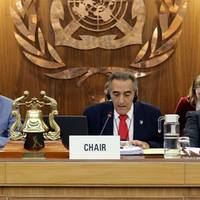
The IMO’s Sub-Committee on Pollution Prevention and Response (PPR 11) agreed new guidance on several key environmental issues.Meeting from February 19 to 23, 2024, the following guidance will now be submitted to the Marine Environment Protection Committee for approval this March (MEPC 81) and October (MEPC 82):• the safe transport of plastic pellets by sea• best practices for cutting black carbon emissions from ships operating in or near the Arctic• reducing risks of use and carriage…
Rem Offshore Chooses Vard Electro's SeaQ Integrated Bridge for New CSOV Vessel
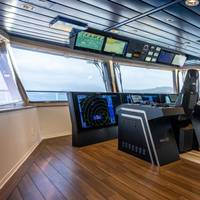
Vard Electro’s SeaQ Integrated Bridge solution is being implemented in the offshore wind sector for the first time, following installation on Rem Offshore’s newbuild construction service operation vessel (CSOV) Rem Power to assist in optimizing environmental performance.“We are making strong investments in new low-emission technologies to cut the environmental impact of offshore wind operations in line with increasingly stringent regulations and requirements from clients, banks and other stakeholders…
KR Upgrades Its Emissions Reporting System
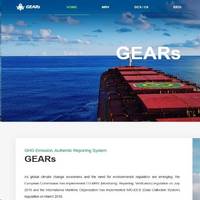
Korean Register said recent upgrades to its greenhouse gas (GHG) Emission Authentic Reporting system (KR GEARs) will enable maritime stakeholders to more easily ensure compliance with GHG regulations in a shorter period.Launched by KR in 2019 to help shipping companies and operators to manage their fleets' GHG emissions data and remain compliant with tightening GHG regulations, KR GEARs has been updated to include a new real-time carbon intensity indicator (CII) monitor, CII simulator…
StormGeo Debuts 'Smart Carbon Intensity Indicator' Tool for Ships
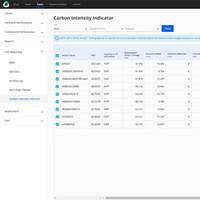
StormGeo launched a new Carbon Intensity Indicator (CII) Dashboard that provides ship operators with the ultimate digital tool for calculating, reporting, and proactively improving the CII rankings of their fleet.The new CII Dashboard is a key addition to StormGeo’s software and services suite, s-Suite where it has been integrated into the s-Insight platform.CII RulesThe CII is an operational efficiency indicator that measures how efficiently a ship transports goods or passengers in grams of CO2 emitted per cargo-carrying capacity and nautical mile based on its Annual Efficiency Ratio (AER).
Shell to Install Kongsberg's JAWS Software on 45 LNG Carriers
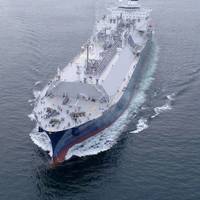
Shell has signed a five-year contract for the installation of Kongsberg's JAWS (Just Add Water System) software on board 45 of the LNG carriers chartered by Shell.These are LNG carriers that already utilize the Kongsberg Maritime K-IMS Information Management System application suite. K-IMS is a web-based solution that gives both ship crews and shore teams continual access to crucial voyage and vessel data. The provision of JAWS as an application within the K-IMS suite renders it instantly available to all K-IMS users.The contract signing follows a successful year-long trial…
BIMCO's New Carbon Emissions Clauses a 'Game-changer'
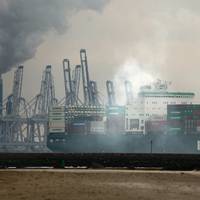
A series of clauses has been drafted in response to strict new environmental legislation that will seek to reduce the industry's carbon emissions and which will change the way ships are operated in the futureFrom January 1, 2023, the International Maritime Organization's revised initial greenhouse gas rules will start to take effect, with the aim of reducing carbon emissions from ships by 40% from 2008 levels by 2030. This will involve ships meeting increased technical measures to improve a ship's energy efficiency (EEXI)…
Jiangnan’s Digital VLGC Design Earns LR AIP
Classification society Lloyd’s Register (LR) said it has awarded approval in principle (AIP) to Chinese shipbuilder Jiangnan Shipyard Co.
Rewrite the Rules: The Path to Zero Emissions

With social media updates and conference agendas addressing the subjects of climate change, emissions reductions and alternative fuels, it’s a wonder we are not climbing the Himalayans in search of the Jedi Master that will provide us with the magic potion. Yoda’s blessing with a calming breath, “You have chosen wisely.”Government emissions intervention started with a move to reduce energy and fuel consumption measured in greenhouse gas (GHG), at a time when the world and our politicians spoke about global warming.
ICS Thrusts on CO2 Reduction
International Chamber of Shipping (ICS) plans to take concrete steps to support further CO2 reduction by international shipping.The representatives of the world’s national shipowners’ associations met last week in the Faroe Islands to review the priorities of the global shipowners’ association.ICS agreed a suite of actions in support of the UN International Maritime Organization (IMO) strategy to decarbonise international shipping in line with the United Nations 1.5 degree climate change goal.Speaking from the Faroe Islands, ICS Chairman, Esben Poulsson said: "It is imperative that IMO Member States adopt a new global regulation to mandate further short term CO2 reduction measures at the next session of the Marine Environment Protection Committee in 2020.
Shipping to Halve Carbon Footprint by 2050
The world's principal shipping organisation, representing around 80% of the world’s merchant tonnage, International Chamber of Shipping (ICS) remains confident that shipping will improve its carbon efficiency by at least 40% by 2030 compared to 2008, in line with the UN International Maritime Organization (IMO) targets to reduce greenhouse gas (GHG) emissions. This follows important decisions made by the IMO Marine Environment Protection Committee (MEPC 74) which met in London this week, said a press release from the world’s national shipowner association.ICS Secretary General, Guy Platten said: “We welcome the adoption of important new IMO regulations to strengthen and bring forward the application of the Energy Efficiency Design Index for several different types of new build vessel…
Study: EC Shipping Emissions Study Released
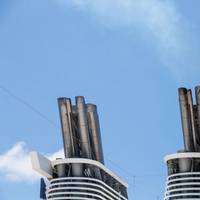
Shipping emissions: International measures needed to cut operational greenhouse gas emissions of existing fleet by 2030 – new studyThe international shipping sector needs to quickly adopt short-term policy measures to cut operational greenhouse gas (GHG) emissions of the existing fleet, according to a new study. The study concludes that only a subset of potential policy options, namely those that mandate changes in how the existing fleet is operated can achieve the significant effect required to meet the sector’s emission reduction objectives.
IMO 2020, IoT & the Enviro Agenda
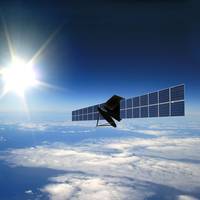
While conservatism is a hallmark of maritime, research from Inmarsat finds that IoT may be helping turn the tech tide by delivering new solutions that ease rather than complicate compliance.With environmental imperatives mounting, shipping’s hesitation concerning new technology has been laid bare in an Inmarsat Research Program report that includes data on how far the industry sees IoT-based solutions as a gateway to sustainability. Directly out the porthole is the IMO 2020 fuel sulfur cap, but further along is 2050 the target to cut GHG ship emissions by 2050.
ICS Hopes for Zero CO2 Fuels
International Chamber of Shipping (ICS) believes that the 2020 global sulphur cap will be the regulatory game changer of the decade with profound implications for the economics of shipping.However, there are even more profound changes to come. "We are rapidly moving into a multi-fuel future to be followed we hope, in the 2030s, by the arrival of commercially viable zero CO2 fuels suitable for global application,” says Esben Poulsson, Chairman of ICS.As the 1 January 2020 deadline for the sulphur cap approaches, ICS members reviewed progress in persuading the UN International Maritime Organization (IMO) to take measures to address expected implementation problems.
Shanghai Waigaoqiao Shipyard Delivers World's First iVLOC
The world’s first intelligent very large ore carrier (iVLOC), the DNV GL-classed Pacific Vision, was delivered by Shanghai Waigaoqiao Shipyard to China Merchants Energy Shipping Company.Norway-headquartered international accredited registrar and classification society said in a statement that the vessel is the world’s first VLOC to implement DNV GL’s SmartShip descriptive notation.To qualify for the notation, Pacific Vision has been outfitted with an integration platform, a smart navigation decision support system, a ship energy efficiency management and optimization system, and smart-vessel operation and maintenance system.“It’s a great honour to have worked with Shanghai Waigaoqiao Shipyard…
GMN Promotes Technologies to Cut Shipping Emissions
Practical efforts to implement ship energy-efficiency measures and promote technology transfer are an integral part of International Maritime Organization (IMO)'s initial strategy to reduce greenhouse gas emissions from ships.A press release from the UN-body said that this is embodied in the global network for energy-efficient shipping under the Global MTCC Network (GMN) project, funded by the European Union and run by IMO.Representatives from the five Maritime Technology Cooperation Centres (MTCCs) in the GMN network recently met for their second annual meeting (22-26 October) in London, United Kingdom, on the sidelines of IMO’s Marine Environment Protection Committee (MEPC 73) meeting.Technical training for MTCC staff on energy efficiency in ship design and operations…
Rolls-Royce Battery System for Two Offshore Vessels
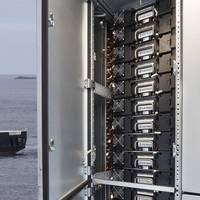
Rolls-Royce Commercial Marine said it has received an order to deliver a battery-powered energy system for two offshore vessels (PSVs) operated by Norway-based Golden Energy Offshore.The delivery includes the SAVe Energy system, which was launched by Rolls-Royce earlier this month. In addition, the two vessels will receive an upgrade of the existing Rolls-Royce ship design engineering package to match the new features. This includes an upgrade of the Dynamic Positioning (DP) system…
New App Helps Ship Owners Comply with Fuel Regs
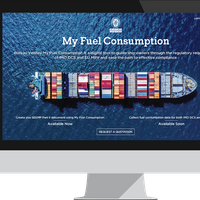
Bureau Veritas has introduced the first phase of My Fuel Consumption, a cloud-based and secure web application for desktop, mobile and tablet that aims to make compliance easy, with a digitized process throughout the various steps of IMO-DCS (declaration of fuel consumption) and EU MRV regulations (CO2 emissions).All ships of 5,000 GT and above must submit IMO-DCS plan to receive a confirmation of compliance, from their flag states or delegated Recognized Organizations (ROs) before January 1, 2019.
IMO Trains Iranian Officials
Iranian officials responsible for implementing IMO standards on air pollution and greenhouse gas emissions from shipping are undergoing IMO training at a national workshop in Tehran, Islamic Republic of Iran (18 April). Around 30 participants from the country’s Ports and Maritime Organization (PMO), Department of Environment and numerous ports are taking part. They are being trained on the IMO treaty restricting air pollution from ships as well as ship energy-efficiency measures – MARPOL Annex VI. This includes measures addressing sulphur oxide (SOx) and nitrogen oxide (NOx), which have been successful in lowering the amount of those pollutants being emitted from ships. The event was hosted by the PMO and run by IMO’s Astrid Dispert and a consultant.
International Shipping Summit in Istanbul Focus on Future
Sustainable use of the oceans, maritime trade, and the digital revolution were some of the issues addressed by International Maritime Organization (IMO) Secretary-General Kitack Lim at the International Shipping Summit in Istanbul, Turkey (17 March). In his opening address to maritime industry and government representatives from around the world, Secretary-General Lim spoke about how IMO, in its leadership role as the global regulator of shipping, is and will be addressing a number of challenges facing the shipping industry. On the marine environment, he said that to be sustainable, human activities have to be balanced with the oceans'…
IMO/MARPOL Amendments Enter Into Force
Requirements for ships to collect data on their fuel oil consumption entered into force on 1 March. Other important amendments to the International Convention for the Prevention of Pollution from Ships (MARPOL) have also entered into force, covering the classification of garbage, including the addition of a new category of “e-waste”, and amendments to the International Oil Pollution Prevention Certificate. The ship fuel oil consumption data reporting requirements are the latest mandatory requirements aimed at enhancing the energy efficiency of international shipping. The data collection will begin on 1 January 2019 with data reported at the end of each calendar year to the International Maritime Organization (IMO)…
Africa Maritime Cooperation Centre Launched
Africa has launched its maritime technology cooperation centre as part of an ambitious International Maritime Organization (IMO)-EU project to establish a global network of centres to further global efforts in addressing climate change. The centres will act as regional focal points for a wide range of activities including improving compliance with existing and future international energy-efficiency regulations; promoting uptake of low-carbon technologies and operations in maritime transport, and establishing voluntary pilot data-collection and reporting systems to feed back into the global regulatory process. In doing so, they will play their part in supporting the United Nations Sustainable Development Goals (SDGs).
IMO Rolls Out Global Maritime Technology Cooperation Centre Network
A global network of centres of excellence in marine technology was officially launched on Monday (4 December) at the headquarters of the International Maritime Organization (IMO). The Directors of five regional Maritime Technology Cooperation Centres (MTCCs) signed a Memorandum of Understanding to establish the global maritime technology centre network. The network of MTCCS - in Africa, Asia, the Caribbean, Latin America and the Pacific - is the mainstay of the GMN maritime technology project, run by IMO and funded by the European Union. The MTCCs are expected to provide leadership in promoting ship energy-efficiency technologies and operations, and the reduction of harmful emissions from ships.
MTCC-Asia is Up and Running
Maritime administrators from over 20 countries across Asia have gathered at the first regional event of Asia’s Maritime Technology Cooperation Centre (MTCC-Asia) to discuss ways to bring shipping into a low carbon future. More than 50 participants joined representatives from the EU and IMO at the Shanghai Maritime University (18-22 September) to discuss national priorities and barriers relating to topics such as greenhouse gas control, ship energy-efficiency and technologies applied for fuel consumption data collection. MTCC-Asia is part of the global network for energy-efficient shipping under the GMN project, funded by the European Union and run by IMO. The network of five regional centres are promoting technologies and operations to improve energy efficiency in the maritime sector.





